
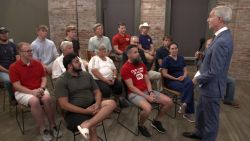

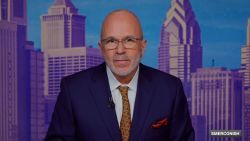









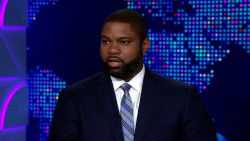
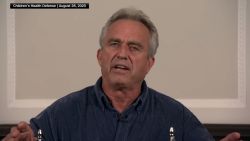


CNN Opinion asked our political contributors to weigh on the first Republican presidential debate of the 2024 season. The views expressed in these commentaries are their own.
SE Cupp: Nikki Haley promised generational change and delivered

Back on February 14, former South Carolina Gov. Nikki Haley announced her run for president with a tweet that stated, “it’s time for a new generation.” For many conservatives, especially those of us looking to move past former President Donald Trump and Trumpism, it was intriguing. But it remained to be seen what that would actually look and sound like — what would the 51-year-old bring to the race that was generationally new?
On Wednesday night, on more than one issue, Haley broke with the old guard in some meaningful ways. On abortion, an issue that’s very important to millennials and Gen Z voters, she defended her pro-life personal position but also admitted what many Republicans won’t — that the math simply isn’t there to ban the procedure on a federal level.
She called for something that’s become a dirty word in the new Republican Party of Trump — consensus — and wondered why we couldn’t agree to ban late-term abortions, to ensure that contraception is available, to refrain from jailing or killing women who get abortions. Her calls for humanizing the issue were a far cry from the more punitive, regressive and draconian policies other Republicans around the country are pushing.
On climate, another issue of import to younger generations, she also struck a middle ground. She agreed that climate change is real, where Trump has called it a hoax. She insisted she does care about clean air and clean water. But she also slammed some of President Joe Biden’s climate policies as counter-productive and beneficial to China.
Additionally, she had some terrific clap-backs at the overly angry Florida Gov. Ron DeSantis and the overly annoying Vivek Ramaswamy, proving she may be older than both but is also more experienced. She may be younger than Biden and Trump, but she’s tough, too. All in all, Haley’s attempts at staying above the fray of childish insults while inserting herself strategically, and making the case that she does, in fact, have a more modern approach than the rest of her party, make her the first debate’s winner.
SE Cupp is a CNN political commentator.
David Axelrod: The biggest winner of the night wasn’t on stage

And the winner was… the man who wasn’t there.
For months, former President Donald Trump was the subject of a will-he-or-won’t-he guessing game regarding his attendance at the first Republican presidential debate. He was courted assiduously by the Republican party chair. He was wooed at a dinner with Fox News executives at Bedminster. He was taunted by some of his opponents, hoping to goad him into attending.
But, in the end, with a nearly 40-point lead in the polls, Trump knew a divided field favors his continued dominance. So, he chose his own audience and a solo taping with a friendly conservative commentator – Tucker Carlson – wagering that his opponents would vigorously spar among themselves. And spar they did.
Vivek Ramaswamy, the glib and gleefully audacious 38-year-old tech entrepreneur who has offered himself as an anti-establishment populist and culture warrior in Trump’s image, sparred with former Vice President Mike Pence, former New Jersey Gov. Chris Christie and former South Carolina Gov. Nikki Haley.
An unexpectedly feisty Pence sparred with Haley on abortion, while Christie engendered loud boos from an audience when he called Trump to account for the alleged crimes that have landed the former president four separate indictments.

Haley and Pence had strong nights. But Florida Gov. Ron DeSantis, who once threatened Trump’s lead before fading to a distant second, badly needed a reset. He hardly achieved that. While DeSantis came armed with energetic, well-rehearsed remarks on crime, the border and a handful of other issues, he faltered uncomfortably in the give-and-take over Pence’s role on January 6 and his position on abortion, adding to an impression of inauthenticity.
On Thursday, Trump faces yet another turning point – his surrender in a state criminal case in Georgia. But nothing that happened in Milwaukee on Wednesday damaged Trump’s position as a prohibitive frontrunner for his party’s nomination.
David Axelrod, a CNN senior political commentator and host of “The Axe Files,” was a senior adviser to former President Barack Obama and chief strategist for the 2008 and 2012 Obama presidential campaigns.
Karen Finney: Ron DeSantis falls flat
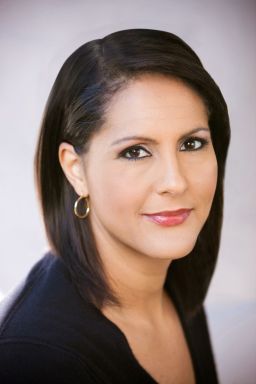
After weeks of buildup and reports of serious debate preparation with a top Republican debate coach, this was supposed to be the night that Florida Gov. Ron DeSantis started to turn his flailing campaign around. Instead, DeSantis delivered a flat debate performance devoid of any standout moments, demonstrating why he is the best alternative to former President Donald Trump.
Time and again DeSantis came off as stilted. He consistently chose to ignore the question being asked and pivoted instead to overly rehearsed responses from debate prep that were devoid of passion or compassion and merely meant to check MAGA boxes. By adhering to those well practiced responses, DeSantis demonstrated a lack of political agility, missing opportunities to connect with the audience.
For example, rather than offering a serious response to a Gen Z Republican voicing generational fears about climate change, DeSantis chose to attack President Joe Biden’s trip to Hawaii. DeSantis also continued his failed attempt to cast himself as the MAGA warrior for a new generation with tough-guy rhetoric and false attacks on financier and political donor George Soros, by repeating the false claim that he had eliminated critical race theory from K-12 schools in Florida (critical race theory was never taught in Florida’s K-12 schools, according to state educators) and, as CNN’s own fact check shows, through significant exaggerations about his record during Covid-19.
Time and again, DeSantis was outshined and overshadowed by politicians on the stage with more charisma and stronger debating skills, several of whom delivered memorable moments, such as former New Jersey Gov. Christie’s “Chat GPT” comment.
DeSantis even failed the most basic debate strategy for a candidate: flashing a genuine smile. At one point, he looked as though he was in physical pain as he attempted a strained smile while saying, “I will not let you down.”
Karen Finney is a Democratic strategist and CNN political commentator.
Patrick T. Brown: The GOP generational divide was on stark display

Former President Donald Trump may have been absent from the debate stage, but his familiar notes of “American carnage” were still brought to the stage, in the person of 38-year-old entrepreneur Vivek Ramaswamy.
He was an eager combatant, often wresting the spotlight toward himself in a way that Florida Gov. Ron DeSantis seemed unable to. And a key interchange with former Vice President Mike Pence, who seemed visibly annoyed by Ramaswamy’s ready-made attack lines, put the divide between the pre-Trump and post-Trump GOP on vivid display.
Ramaswamy called for a new vision for the GOP, leading to criticism from Pence: “The American people are the most faith-filled, freedom-loving, idealistic, hard-working people the world has ever known, we just need government as good as our people.”

That kind of earnest up-lift has been relied on by generations of Republican politicians. But Ramaswamy — like Trump — clearly assumes, and perhaps rightly so, that those words ring hollow to communities that have seen economic decline, the ravages of opioid use and rising crime. “It’s not morning in America,” he jibed. “We live in a dark moment.”
Ramaswamy, who was born 26 years after Pence and nearly four decades after Trump, will almost certainly not be the Republican nominee, if for his idiosyncratic foreign policy stances alone. But his surprising success so far — drafting off the former president’s MAGA energy and bringing an unbridled populist energy to the campaign trail and the debate stage — suggest a finger on the pulse of a GOP base that isn’t satisfied with politicians promising them easy answers if only [the] government would get out of the way.
Patrick T. Brown is a fellow at the Ethics and Public Policy Center, a conservative think tank and advocacy group based in Washington, DC. He is also a former senior policy adviser to Congress’ Joint Economic Committee.
Sophia A. Nelson: I knew we were in trouble when debate began with ‘Rich Men North of Richmond’
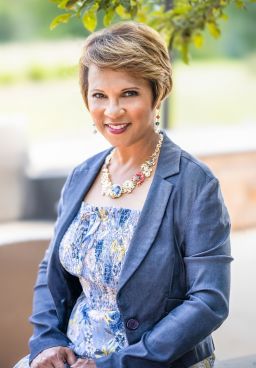
I had very low expectations going into Wednesday night’s Republican presidential debate. I knew we were in trouble, however, when the introductory video completely ignored the January 6 insurrection, as if it never happened, and the moderators asked the opening question about the relevance of the song “Rich Men North of Richmond” from conservative singer Oliver Anthony.
Yes, the stage was more diverse than we have seen in past GOP presidential debates. It included two South Asian Americans and one African American.
The clear winner, however, was former South Carolina Gov. Nikki Haley. She was focused, articulate and well informed, and offered very centrist answers. On the other hand, Vivek Ramaswamy was an unserious show horse. His answers on Ukraine, alone, are disqualifying for a serious presidential candidate. Lastly, Sen. Tim Scott of South Carolina landed flat. He was slow, unenergetic and stumbled with his misguided attacks on the so-called two-tiered judicial system and his rambling answer on abortion.
Haley had a great one liner — quoting British Prime Minister Margaret Thatcher — “if you want something said, ask a man. If you want something done, ask a woman,” when the candidates were asked if they believed in human behavior causing climate change. She said that “climate change is real.” She hit it out of the park on the abortion issue when she said we should all agree not to demonize or criminalize women or their doctors. And, as the only woman on the stage who carried babies to term, she was credible.
But the GOP’s onstage diversity falls flat in reality because all of the aforementioned candidates deny systemic racism exists, and they all believe in stoking their base with the critical race theory/wokeness boogeyman.
The bottom line is: This is not your grandfather’s Republican Party. They want angry culture warriors to fight wokeness and rage at an America in decline. Those lines got the most reaction tonight, not the “diversity” of the candidates speaking them.
Sophia A. Nelson, a former investigative counsel in the US Congress, has worked for many years as a consultant on diversity and inclusion issues. She is the author of the book “Black Woman Redefined: Dispelling Myths and Discovering Fulfillment in the Age of Michelle Obama.”
Scott Jennings: The Trump question we can’t ignore

Wednesday night’s GOP presidential debate brought some surprises, and former Vice President Mike Pence and former South Carolina Gov. Nikki Haley overperforming expectations were two big ones. Florida Gov. Ron DeSantis stabilized himself and had some good moments — especially in deconstructing “Bidenomics” — but he did not dominate the stage.
Entrepreneur Vivek Ramaswamy filled the Donald Trump hole and has a polished stage presence, but after a strong start, his act wore thin as he interrupted and insulted the other candidates. Sen. Tim Scott of South Carolina was too wonky, although he did make some terrific points – including on pro-life issues, and North Dakota Gov. Doug Burgum and former Arkansas Gov. Asa Hutchison barely registered on the stage. Haley supplanted former New Jersey Gov. Chris Christie as the principal anti-Trump foil in the race, which was a surprising development.
Pence was downright feisty at times, mixing it up with Haley and Ramaswamy and refusing to back down. He is highly unlikely to supplant Trump, but he can walk out of the debate hall with his head held high. Even the other candidates largely praised his actions on January 6.
Haley is an extremely polished public speaker. She unapologetically defended traditional Republican views on foreign policy and refused to back down despite those views becoming more complicated in an increasing isolationist party. She handled Ramaswamy’s interruptions and condescension better than anyone on the stage.
The question is: Did anyone move a single Trump voter from his column to theirs? I am dubious. And as long as all of these people stay in the race, the fragmentation will continue to protect his frontrunner status. On Thursday, Trump is expected to turn himself in to the proper authorities in Georgia. And I suspect we’ll see more footage on television of his motorcade than any of the zingers or conflict that defined Wednesday’s debate.
Scott Jennings, a CNN contributor and Republican campaign adviser, is a former special assistant to President George W. Bush and a former campaign adviser to Sen. Mitch McConnell. He is a partner at RunSwitch Public Relations in Louisville, Kentucky. Follow him on Twitter @ScottJenningsKY.
Jill Filipovic: Ramaswamy was eye-catching for all the wrong reasons
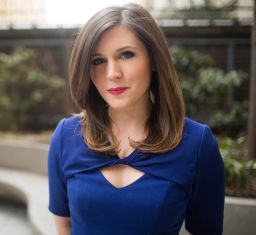
Vivek Ramaswamy, the 38-year-old millennial entrepreneur running for president, has positioned himself as a young, fresh face to reinvigorate a staid Republican Party, and he certainly energized the debate stage — at least insofar as he radiated an eye-catching combination of ignorance and arrogance.
Ramaswamy manages to both be on the opposite side of most of his generation (and mine) on the issues we care about most, while embodying the worst of millennial stereotypes. He called climate change a “hoax.” Meanwhile, 71% of millennials say climate change should be a top priority, according to Pew Research Center.
He wants to gut the federal government, getting rid of everything from the Internal Revenue Service to the Department of Education. A Pew poll found that 64% of millennials want the government to do more to solve problems.
He blamed poor educational outcomes partly on an “epidemic of fatherlessness” and single mothers who need a man in the house. More than 60% of millennials say single motherhood is either good or not a problem, according to Pew.
At the same time, he embodied much of what older generations have long said about millennials: that we’re entitled, unwilling to put in the work and want to catapult ahead professionally without paying our dues.
Ramaswamy is less a representative millennial than an avatar of a particular millennial subculture: the online reactionary, happy to do away with the inconvenient trappings of democracy if it means establishing power of the strong over the vulnerable.
These millennials are a small minority, and they tend to fly under the mainstream radar, staffing right-wing think tanks and the offices of reactionary politicians and spending their social media time on right-wing social networks.
To anyone not predisposed to sympathize with his radical burn-it-all-down politics, Ramaswamy came off as more insufferable and detestable than fresh and young. But while the strain of conservatism he represents is far outside of the millennial mainstream, it is central to the ideology fueling many of today’s young Republicans.
Jill Filipovic is a journalist based in New York and author of the book “OK Boomer, Let’s Talk: How My Generation Got Left Behind.” Follow her on Twitter.
G.T. Bynum: Nikki Haley has that rare gift of courage

Whenever I talk about national politics with everyday people here in America’s heartland, the most common response I hear is exasperation over the increasing division in our country. Most Americans I know hope for candidates with actual track records of making things happen, who can paint a positive vision for our country and bring us together.
So watching Wednesday’s debate, who carried the mantle of former President Ronald Reagan — the last Republican to defeat an incumbent Democrat president — in pointing us toward that “Shining City On a Hill”?
From my vantage point, one candidate stood out. Former South Carolina Gov. Nikki Haley combined political courage, policy proposals based on her experience in high office and righteous indignation when it comes to partisan spin.
Haley chose a Republican primary debate to rightly point out that the GOP holds much of the blame for the federal debt being shamefully passed on to future generations. She acknowledged the existence of climate change, while wisely noting that other countries should be held to the same standards we hold ourselves to. And she risked being mischaracterized as being anything other than pro-life by pointing out the need to approach the issue of abortion with compassion and honesty about the low odds of the Senate adopting federal ban.
You just don’t see national candidates with guts like that very often. She showed the respect she has for the American people by being a straight shooter rather than just telling us what we want to hear. She treated us like adults.
She called out Putin as a murderer. Her passionate defense of Israel came across as deeply felt. And she made the outrageous suggestion that building consensus in our country is important.
Courage, experience, vision, honesty, a desire for unity: Nikki Haley presented all of these qualities in tonight’s debate and offered a compelling case for her candidacy to be the next president of the United States.
G.T. Bynum, a Republican, is currently serving his second term as the mayor of Tulsa, Oklahoma.
Nicole Hemmer: We saw a deeply fractured Republican Party

Without former President Donald Trump, the first Republican presidential debate felt largely irrelevant to the 2024 election. But while it offered few insights into how the current race will shake it, it made clear that, when Trump eventually fades from the headlines, he will leave behind a deeply fractured Republican Party.
On issue after issue — abortion, Ukraine, the events of January 6, 2021, Trump’s four indictments — the eight debaters reflected deep splits in the party. These are core issues about America’s role in the world, the power of the federal government versus the states, the tension between rule of law and lawless loyalty. The cult of personality around Trump has sublimated these policy debates since 2016. The Trumpless debate revealed that they remain fault lines for the party.
The GOP has been here before. In 1952, it faced a choice between the nationalism and buttoned-up conservatism of Robert Taft and the internationalist, celebrity candidacy of Dwight Eisenhower. (The GOP liked Ike.)
Throughout the 1960s and 1970s the party struggled to reconcile its conservative and liberal wings, until Ronald Reagan finally won the party for conservatives in 1980. And in the early 1990s, Pat Buchanan exposed the deep split between the Reaganites and a paleoconservative movement that was opposed to immigration, free trade and even, at times, democracy.
So division is not a new feature of Republican politics. But the conflicting worldviews on display at the first Republican debate are unlikely to be worked out in the 2024 primaries, which ultimately will revolve around Donald Trump.
To that end, it’s worth noting that the big change Trump was supposed to herald was nowhere on display at the first debate: there was no real talk of economic populism, no outright defense of the GOP as the party of the working class. Trump has offered little more than lip service to those ideas, and if the debate was any indication, it has yet to find real champions with any support in the party.
Nicole Hemmer is an associate professor of history and director of the Carolyn T. and Robert M. Rogers Center for the Study of the Presidency at Vanderbilt University. She is the author of “Partisans: The Conservative Revolutionaries Who Remade American Politics in the 1990s” and cohosts the podcasts “Past Present” and “This Day in Esoteric Political History.”
Geoff Duncan: We saw a glimmer of hope for the GOP

On Wednesday, Republican voters saw what a post-Donald Trump era could look like. There were good faith policy disagreements on serious issues including the economy, crime, government spending and Ukraine.
This is what it once was and could be again for the GOP.
There were signs of hope, especially when the discussion turned to Trump, whose presence as the current frontrunner loomed large, despite the fact that he chose to sit out the debate.
Apart from Vivek Ramaswamy, who bragged about his pledge to pardon the former president, who is facing four indictments, none of the other candidates threw a lifeline to Trump. Yes, there were some deflections and quick pivots to the weaponization of the Department of Justice, but there were no outright defenses.
This might be incremental progress, but it is progress all the same.
Former UN Ambassador Nikki Haley set the tone early by taking aim at Trump’s runaway spending. Former New Jersey Gov. Chris Christie and former Arkansas Gov. Asa Hutchinson went even further, refusing to pledge support for Trump should he become the nominee. It may not have made them the most popular people in the room, but it needed to be said.
These are glimmers of hope. The Republican Party’s future can be bright, but only if we’re willing to leave the Trump era in the past.
Geoff Duncan, a CNN political contributor and Republican, served as Georgia’s lieutenant governor from 2019 to 2023. He is a former professional baseball player and the author of “GOP 2.0: How the 2020 Election Can Lead to a Better Way Forward for America’s Conservative Party.”
Roxanne Jones: The debate proved why Trump is still the leader of the GOP pack

Former President Donald Trump may be scheduled to surrender for arrest in Georgia on Thursday, but no doubt he was smiling Wednesday night after watching the first GOP presidential primary debate, confident that his staggering lead in the polls is safe.
What a clown show.
Aside from flashes of reason and intelligence from former UN ambassador Nikki Haley — my winner for the night — and former Arkansas Gov. Asa Hutchinson in a few instances, not one of the GOP candidates sounded like a serious contender for the White House. Florida Gov. Ron DeSantis was disappointing. Vivek Ramaswamy was too snarky and annoying. And former Vice President Mike Pence deflected from answering too many questions by reverting to Bible talk.
Haley was the only candidate who seemed earnest about the country’s many problems, telling Americans that the nation’s economic woes were also the result of bad Republican policy. It was also refreshing to hear Haley call for more reasoned conversation around the abortion debate – something I’ve been seeking for years.
Calling abortion a personal decision and declining to push for a punitive federal abortion ban, Haley suggested Americans focus on finding consensus on areas of broad agreement, such as banning late-term abortions.
Deflections, annoying one-liners, squabbles and way too much cliche religious testimony — it was not a great night for American democracy. This debacle of a debate only proved why Trump is still the leader of the GOP pack.
Roxanne Jones, a founding editor of ESPN The Magazine and former vice president at ESPN, has been a producer, reporter and editor at the New York Daily News and The Philadelphia Inquirer. Jones is co-author of “Say it Loud: An Illustrated History of the Black Athlete.” She talks politics, sports and culture weekly on Philadelphia’s 900AM WURD.
Kristen Soltis Anderson: Nikki Haley came out on top

Former South Carolina Gov. Nikki Haley’s strong performance will make many Republican voters reconsider her candidacy. I have to imagine that, of everyone on the stage, Haley is the one who makes Democrats the most nervous following Wednesday’s debate.
Her answer on the tough issue of abortion acknowledged the difficult political realities of the issue and wove in personal touches like her own journey to have her children. Her defense of a strong American foreign policy played right to her strengths, having served as the US ambassador to the UN under the Trump administration. And, of everyone who tried to take entrepreneur Vivek Ramaswamy down a peg, I think she got the better of him in their exchange about Ukraine and China.
In a race against former President Donald Trump, where there will be pressure for the field to narrow and consolidate quickly, Haley has kept herself in the mix.
I also think that you could call former Vice President Mike Pence a winner of sorts, not because I think he will rocket up in the polls, but because he stood on stage and forcefully and eloquently defended his actions on January 6, 2021, to a Republican audience. He said what he got into this race to say. And the real victory here was that, in doing so, he got a number of candidates on that stage to say they believe he did the right thing that day.
Kristen Soltis Anderson, a CNN political commentator, is a Republican strategist and pollster and author of “The Selfie Vote: Where Millennials Are Leading America (and How Republicans Can Keep Up.)”
Raul A. Reyes: Candidates’ takes on immigration prove how far to the right the GOP has moved
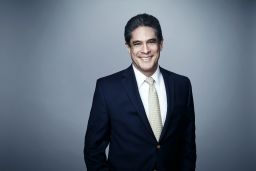
Thanks to former President Donald Trump deciding to skip the first GOP presidential debate, the evening had the feel of a birthday party or celebrity roast where the guest of honor decided not to show up. As a result, viewers were left with an assortment of pugilists, underdogs and wannabes.
When immigration came up, it seemed like a contest over who could be the most misleading and extreme on the issue. Florida Gov. Ron DeSantis vowed to send troops to the southern border to use force and leave drug pushers “stone cold dead” — an apparent endorsement of extrajudicial killings.
The governor said that he would support a military incursion into Mexico by Special Forces to take out drug cartels, which is truly an appalling proposal. And Sen. Tim Scott of South Carolina also bemoaned the flow of fentanyl across the border. What neither of them mentioned, as they conflated migration with drug smuggling, is that almost 90% of convicted fentanyl traffickers last year were US citizens.
Former Vice President Mike Pence declared that, when President Joe Biden took over office, “he threw open the southern border of the United States.” This simply does not square with reality. Our borders are not open. The Biden administration has imposed significant restrictions on asylum-seekers, and the number of unauthorized border-crossings at the southwest border for July 2023 was down 27% from July 2022.
It was former New Jersey Gov. Chris Christie who took one of the most extreme immigration positions, saying that undocumented people who are already here would have to be removed. That the former governor of a blue state would advocate for mass deportations is a reflection of how far to the right the GOP has moved on this issue. And all the dangerous talk about the “invasion” at our southern border not only feeds the fear that helps inspire hateful acts like the El Paso massacre, but it obscures the fact that claiming asylum in the US is a legal humanitarian right.
One missed opportunity by the Fox News moderators was not questioning the candidates about family separations. In his CNN Town Hall in May, Trump suggested he would be open to resuming this practice, and would have been revealing to see how many of the 2024 Republican hopefuls would go down this barbaric path.
Raul A. Reyes is an attorney and a member of the USA Today board of contributors. Follow him on Twitter @RaulAReyes.
Jon Gabriel: Immigration still resonates with GOP voters

Immigration has been a major issue in recent campaigns, and if the first Republican presidential primary debate is any barometer, it’s only heating up.
As candidates traded barbs on Russia’s invasion of Ukraine, Florida Gov. Ron DeSantis deftly pivoted to an issue nearer and dearer to Republican hearts. “I’m not going to send troops to Ukraine,” DeSantis declared, “but I am going to send them to the border.”
While the moderators largely avoided immigration, DeSantis was wise to insert it where he did. According to a February Gallup poll, 71% of GOP voters are dissatisfied with the current level of immigration, up from 40% when President Joe Biden took office.
One thing Trump’s 2016 campaign revealed is that American voters focus on different issues than those in the Beltway. This fact was reinforced Wednesday night as all the other candidates eagerly took up immigration.
When DeSantis accused drug cartels of killing tens of thousands of our fellow citizens, Sen. Tim Scott of South Carolina humanized the issue, stressing the need to stop the flow of fentanyl and save tens of thousands of American lives each year.
It’s unclear whether primary voters will agree with DeSantis’ support for involving the US military, but border state residents are no doubt happy to see the issue highlighted.
In the long history of my own state of Arizona, cooperation with the Mexican government is the most effective remedy to illegal immigration. The cartels must be stopped cold while allowing flexibility for cross-border work, business development and our shared southwestern culture.
When it comes to border enforcement, the carrot is stronger than the stick.
Jon Gabriel is editor-in-chief of Ricochet.com and an opinion contributor to The Arizona Republic. Follow him on Twitter at @ExJon.




